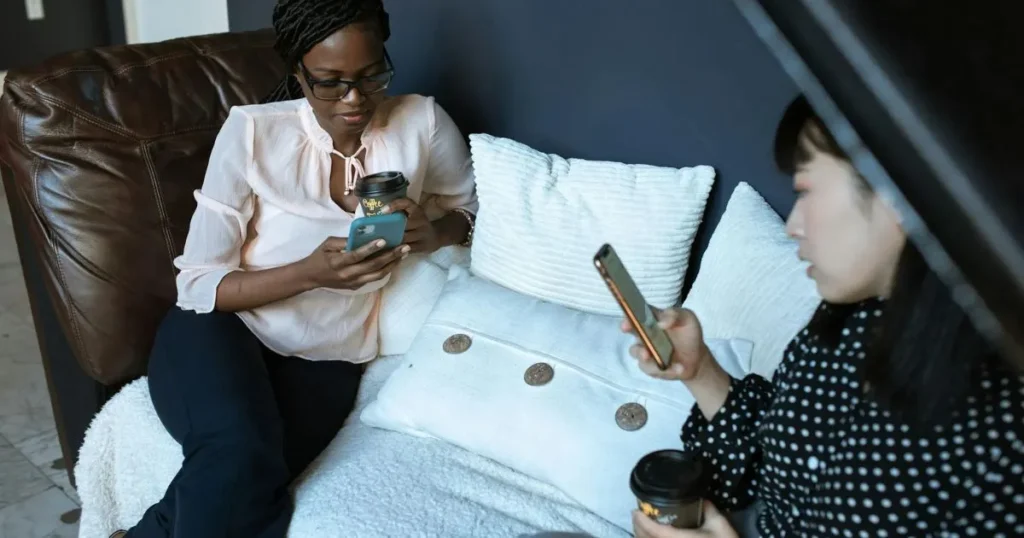
In today’s hyperconnected world, we live more online than ever before. We share photos, updates, and even our emotions through social media like Facebook, Instagram, and TikTok. On the surface, it feels like social networks bring people closer. They allow us to stay in touch with long-distance friends, meet new people, and reconnect with old ones.
However, for couples—especially married ones or those in committed relationships—these same platforms can also create distance, confusion, jealousy, and even mistrust. That’s the paradox: while social media connects people globally, it can quietly drive a wedge between partners under the same roof.
So how can couples enjoy the benefits of being online without risking the strength of their relationship? Let’s explore the risks, emotional impact, and most importantly—how to use social networks without problems.
The Allure of Online Connection
At first, social media seems innocent. You might scroll through stories while sipping coffee or reply to a message while your partner’s watching TV. It’s a harmless habit, right?
Well, not always.
The constant access to people, updates, and entertainment can become addictive. Some users, without realizing it, spend more emotional energy on their phones than on their partners. Likes, comments, and attention from strangers may start to feel more rewarding than real-life intimacy.
Moreover, old flames often reappear through a simple “friend suggestion.” A seemingly innocent message can lead to emotional conversations. In many cases, people don’t intend to cheat—but emotional affairs can begin with just a few DMs exchanged during lonely evenings.
The Invisible Wall Between Couples
Let’s talk honestly. When was the last time you and your partner had a deep conversation without one of you checking your phone?
This is where social media becomes dangerous—not because it exists, but because it interferes with emotional presence. One partner might feel ignored while the other scrolls. A moment that could have been spent bonding becomes a silent gap.
Even worse, comparison creeps in. Couples see glamorous travel posts or romantic gestures from influencers and start asking, “Why don’t we do that?” These curated highlights often create unrealistic expectations that fuel dissatisfaction.
Suddenly, real life feels too normal. The partner you once adored now seems less exciting compared to strangers who seem perfect online.
Jealousy, Privacy, and Trust Issues
Let’s say your partner is always liking the selfies of a certain person. Or they laugh too often at one specific user’s stories. Even if nothing inappropriate is happening, it’s easy for jealousy to take root.
Social media blurs boundaries. Is liking a photo harmless? Or does it mean interest? Should couples share passwords, or is that controlling? Is hiding conversations a sign of betrayal—or just a need for privacy?
These are complicated questions. That’s why open communication and mutual agreements are essential.
Many arguments start with something small—a comment, a like, a follow request—but they grow because couples haven’t clearly discussed what feels acceptable online.
Signs That Social Media Is Harming Your Relationship
To know whether social networks are weakening your relationship, ask yourself:
- Do you spend more time interacting online than talking to your partner?
- Have you ever deleted a message or hidden a post to avoid conflict?
- Do you feel more emotionally connected to someone online than your spouse?
- Has your partner ever expressed feeling neglected, ignored, or jealous because of your phone use?
- Do you argue about likes, comments, or online “friends”?
If you said yes to several of these, it’s time to take a step back and evaluate how social networks are influencing your emotional connection.
Emotional Affairs Start Slowly
Many people believe cheating only happens physically. But in today’s digital world, emotional cheating is just as common—and sometimes more painful.
It usually starts with chatting for fun. Then, it becomes regular. You look forward to those conversations more than the ones you have at home. You begin sharing personal things you don’t share with your partner. Eventually, it becomes a secret.
And when your partner finds out—even if it wasn’t physical—it still feels like a betrayal.
That’s why couples must recognize how quickly emotional lines can be crossed online, even unintentionally.
related : Should Brides Accept Their Partners’ Social Media Friendships? Boundaries, Trust, and Reality Checks
How to Use Social Networks Without Problems

So, how can couples protect their relationship while staying active online? Here are practical and respectful tips:
1. Set Boundaries Together
Sit down with your partner and decide what’s acceptable and what’s not. For example:
- Is it okay to follow exes?
- Should passwords be shared?
- Is flirting—even in jokes—crossing a line?
Creating rules together helps both partners feel safe.
2. Make Time for Real Connection
Put the phones down during meals, walks, or bedtime. Even 30 minutes of undistracted conversation can help rebuild closeness.
You don’t need hours. You just need quality moments.
3. Be Transparent, Not Secretive
If you have nothing to hide, then don’t hide. If a conversation would make your partner uncomfortable if they saw it, ask yourself why.
Being transparent builds trust. It shows you value your partner’s feelings.
4. Don’t Compare Your Life to Others
Remember, people only post the good parts. They don’t show the arguments, the silence, or the messy side of real life.
Focus on building your version of happiness—not copying someone else’s highlight reel.
5. Compliment Your Partner, Not Strangers
You liked someone’s vacation photo? Great. But have you complimented your partner’s smile lately?
Shift the attention back to your relationship. Make sure your partner feels admired, not ignored.
When Jealousy Happens, Talk About It Gently
Jealousy is a natural emotion. It doesn’t mean your partner is insecure—it means they care. If you feel jealous or if your partner does, avoid blaming. Instead, use calm, honest conversations.
Say:
- “When you laugh at her jokes, I feel overlooked.”
- “I miss how we used to talk more in the evenings.”
These statements invite understanding, not conflict.
Social Media Detox: Try It Together
Want a fresh start? Consider doing a weekend detox. Log out together. Reconnect offline. You might be surprised by how much emotional space opens up when the screens go dark.
This break isn’t about punishment—it’s about remembering the real connection behind the digital noise.
The Bright Side: Social Media Can Strengthen Love Too
Yes, social networks come with risks—but they can also be tools for good.
Use them to:
- Share pictures together
- Celebrate milestones
- Send kind messages during the day
- Tag each other in funny posts or sweet quotes
Social media doesn’t have to pull you apart. With mindfulness and respect, it can become an extension of your bond—not a distraction from it.
In a time when phones are always buzzing, the greatest gift you can give your partner is attention. Social networks may connect millions, but they should never disconnect the one person who matters most—your spouse.
So talk openly, stay transparent, and remember that love thrives offline.
The key is not to avoid social media altogether. Instead, it’s learning how to use social networks without problems, setting clear boundaries, and choosing connection over distraction.
Your relationship deserves presence, not just proximity. And in the end, love always grows where attention goes.



